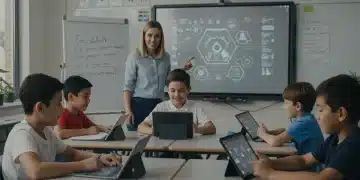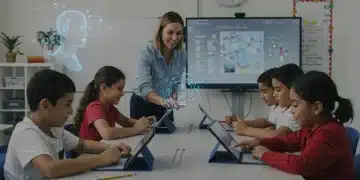Insights on ai-generated media trends shaping the future

AI-generated media transforms content creation and consumption by enhancing creativity, enabling personalization, and raising ethical concerns, while also posing challenges like job displacement and misinformation.
Insights on ai-generated media trends reveal a fascinating intersection between technology and creativity. Ever wondered how AI is reshaping our media landscape? Let’s explore the evolving dynamics together.
Understanding the rise of AI in media
The rise of AI in media is transforming how we create and consume content. With advancements in technology, AI is not just a tool but a collaborator in the creative process. It’s fascinating to see how this change can enhance our media landscape.
The role of AI in content creation
AI systems are now helping creators by generating scripts, editing videos, and even composing music. This technology enables faster production times and opens new avenues for creativity.
- Automatic video editing tools
- AI-assisted scriptwriting
- Smart music generators
Furthermore, AI can analyze audience preferences and tailor content to meet their interests, making media more engaging. The ability of AI to predict trends is invaluable.
Enhancements in user experience
A personalized media experience is now possible with AI’s insightful data analysis. By understanding viewer habits, platforms can suggest content tailored specifically for each user. This not only keeps audiences captivated but also drives engagement.
As AI continues its ascent, it’s essential for creators and consumers alike to adapt. This technology shapes not just how content is made but also how it’s shared and experienced.
Key trends in AI-generated content

The world of AI-generated content is evolving rapidly. As technology advances, we see notable trends shaping how content is produced and consumed. These innovations not only enhance creativity but also improve efficiency.
Personalization at scale
One of the most prominent trends is personalization. AI algorithms analyze user behavior to create tailored content experiences. This means that what you see is influenced by how you interact with media.
- Custom recommendations based on viewing habits
- Dynamic content adaptation for user engagement
- AI-driven marketing strategies that resonate with audiences
Such personalization helps keep viewers more engaged and satisfied, leading to increased loyalty to platforms and brands.
Enhanced storytelling through AI
AI tools are also revolutionizing storytelling. By analyzing successful narratives, AI can assist creators in developing compelling stories that resonate with audiences. This technology can suggest plot points, character development, and even the overall structure of narratives.
AI doesn’t just work behind the scenes; it actively collaborates with writers and artists to enhance the creative process. This cooperation brings fresh perspectives and innovative ideas to the forefront.
Impact of AI on creativity and collaboration
The impact of AI on creativity and collaboration is profound, reshaping how artists and creators approach their work. As tools evolve, they encourage new forms of artistic expression and teamwork.
AI as a creative partner
Rather than replacing human creativity, AI serves as an invaluable partner in the creative process. By analyzing vast amounts of data, AI can suggest innovative ideas or enhance existing concepts. This collaboration allows creators to experiment and push the boundaries of what is possible.
- Generative design in visual arts
- AI-assisted writing tools that inspire new narratives
- Collaboration between machines and humans in music production
AI tools can even personalize creative suggestions, tailoring ideas to an individual artist’s style. This opens up exciting avenues for development and originality.
Enhancing teamwork and communication
AI also positively affects collaboration among creative teams. By automating routine tasks, such as scheduling and file management, team members can focus on high-value work and brainstorming. AI-powered platforms facilitate smoother communication and idea sharing.
Create a culture where creativity flourishes by incorporating AI into collaborative projects. Whether for brainstorming sessions or project management, AI ensures that everyone contributes their strengths.
Challenges in the AI media landscape

The challenges in the AI media landscape are significant as technology continues to develop. While there are numerous benefits to AI in media, several issues also arise, affecting both creators and consumers.
Ethical concerns
One major challenge is the ethical implications of using AI. Issues around copyright, ownership, and authenticity come into play when AI generates content. Who owns the work created by an AI? These questions are complex and need to be addressed as AI technology becomes more prevalent.
- Concerns about plagiarism and originality
- Need for transparent algorithms
- Impact on copyright laws
Additionally, there is a risk of misinformation if AI-generated content is not monitored closely. Given the speed at which AI can create media, ensuring accuracy is critical.
Job displacement
Another challenge is the potential for job displacement within the industry. As AI systems become more capable, some roles traditionally held by humans may become obsolete. This raises fears among creatives about their job security and the future of their professions.
Balancing AI usage with the need for human creativity and input remains crucial. The solution lies in understanding how to integrate AI into workflows without undermining the value of human contribution.
The journey through the AI in media landscape reveals both exciting opportunities and significant challenges. As we embrace AI-generated content, we must carefully navigate ethical considerations and ensure that human creativity remains at the forefront. The evolution of media through AI holds promise for personalization and innovation, yet it also raises concerns about job displacement and the accuracy of content. Ultimately, finding a balance between technological advancements and respecting the human touch in creative processes will be key to leveraging the full potential of AI in media.
FAQ – Frequently Asked Questions about AI in Media
How does AI impact creativity in media?
AI enhances creativity by providing new ideas and suggestions, facilitating a collaborative process between machines and human creators.
What are the ethical concerns surrounding AI-generated content?
Ethical concerns include issues of copyright, authenticity, and the potential for misinformation if AI-generated content is not carefully monitored.
Will AI replace jobs in the media industry?
While AI may automate some tasks, it also creates new roles and opportunities, emphasizing collaboration between AI and human creativity.
How can personalization improve user experience in media?
Personalization uses AI to tailor content to individual preferences, increasing engagement and satisfaction for users.





